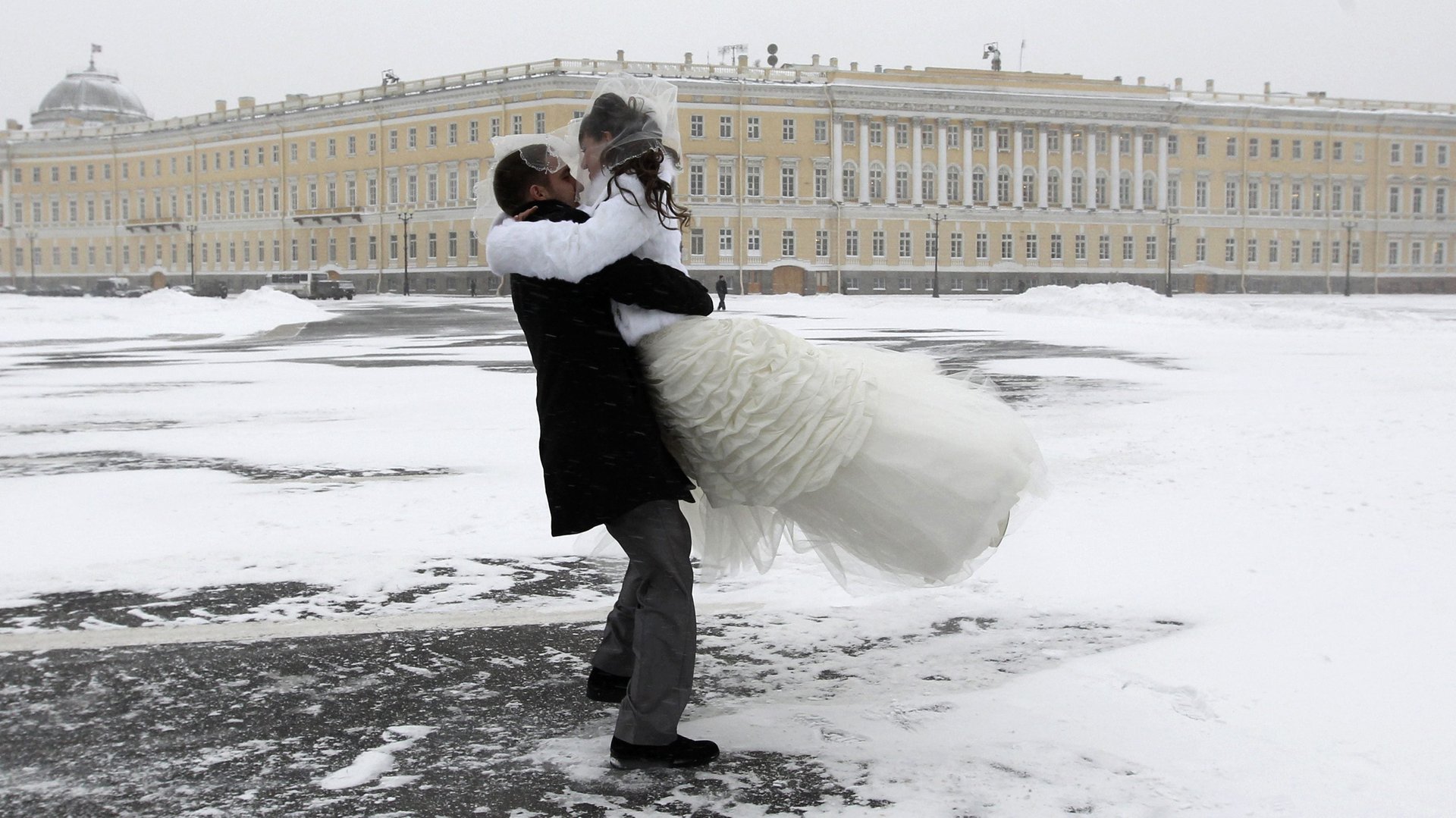The best day to get married is a Tuesday in January
What’s the most important factor when deciding on a wedding day?


What’s the most important factor when deciding on a wedding day?
Hoping for great weather and trying to find a date convenient for the most people are some of the likeliest drivers, but both lead to stress: That your open-air ceremony will be washed away by a freak storm, or the needs of your family and friends will conflict or eclipse your own desires. Those common concerns lead to weddings clustering on just a few sunny Saturdays in the year, driving costs and logistics-planning to spectacular levels.
That’s why we’re advocating the use of cold, hard data to decide your wedding date. Look at it this way: You might not end up marrying on the beach, but you’ll keep costs down and no one—not even your difficult godparents from the other side of the country—can argue with numbers.
There’s no doubt that the expense of weddings is spiraling upwards. The average cost of a US wedding in 2018 was almost $34,000 according to The Knot, a wedding-planning company, which surveyed its own users to get the data. That was up from just over $28,000 when the company first asked in 2013. Weddings in the UK are even more expensive, on average, than those in the US.
These mounting costs, and the stress associated with them, might be counter-productive. A 2014 study of over 3,000 American married people found that people were slightly more likely to divorce if they had a wedding that cost over $20,000 compared to those whose weddings cost less than $10,000. People who had bigger, cheaper weddings divorced less than those with smaller, pricier dos.
Pricier weddings risk setting couples up to fail: They might start their marriages with unneeded debts and—though weddings are an area where many people still receive financial help from family—having an extremely lavish and expensive ceremony arguably doesn’t set couples up well for the tougher financial decisions, the budgeting, and the collective money-management they’ll have to do as part of actually being married and, often, having kids.
Finally, planning an elaborate do is also leading to an inversion, of sorts, where couples decide they must have a memorable and often Instagrammable wedding, but want to keep costs down, leading to measures that feel thrifty, but actually involve passing on costs to guests. A destination wedding in a more affordable country might make catering and venue hire cheaper, but all your guests will have to fly there, rent accommodation, and likely take days off work. Cash bars are much more expensive on a per-drink basis than mass catering, or indeed asking your guests to bring their own drinks. Zola, an online wedding-registry company, surveyed users in 2018 and found that Fridays had become more popular than Sundays as a day to wed. Yes, that leads to a pleasant long weekend; but it also means a collective loss of earnings that is likely higher than your entire budget.
So when should you tie the knot? A look at the data makes it clear there’s only one really rational option for choice of wedding date: a Tuesday in the dead of winter.
Recent data from the UK’s Office for National Statistics examined the average number of weddings per day for the time period 1996 to 2016. July and August, the warmest UK months, are by far the most popular, with many of the days averaging more than 1,300 weddings. When it comes to days of the week, 2016 data showed that Tuesdays are deeply unpopular, with just 5.9% of civil and 1.2% of religious celebrations taking place that day. (Saturdays were the most popular with over 40% of civil ceremonies and three quarters of religious ones taking place that day. In the UK, as in the US, Fridays were more popular than Sundays.)
Christmas Day was by far the least popular day to get married according to ONS data, with an average of just five weddings per year on December 25. Cost-wise, however, a Christmas Day wedding is unlikely to pay off, since venues get booked out for seasonal celebrations. January, overall, is a widely shunned as a month for nuptials. So if flouting convention is your wedding theme in 2020, you’ll likely get the best deals on Tuesday, Jan. 7, 14, 21, or 28.
Popular days vary from country to country: According to the Zola survey, the ten most popular days to get married in the US in 2018 were all Saturdays, but they all fell in October, September, or June. Jennifer Spector, Zola’s director of brand, told Insider that the fall was popular because “the temperature is mild, the photographs are Pinterest-perfect, and it avoids the summer travel season for guests.”
You know what avoids the summer travel season by an even bigger margin? January. Of course, your Tuesday wedding will involve guests taking time off work, and partying will be harder with Wednesday looming. Could that restrict the number of people who accept your invitation? Yes. Would that also help keep costs low? It would. Data, meet romance. I think you two are going to get along.